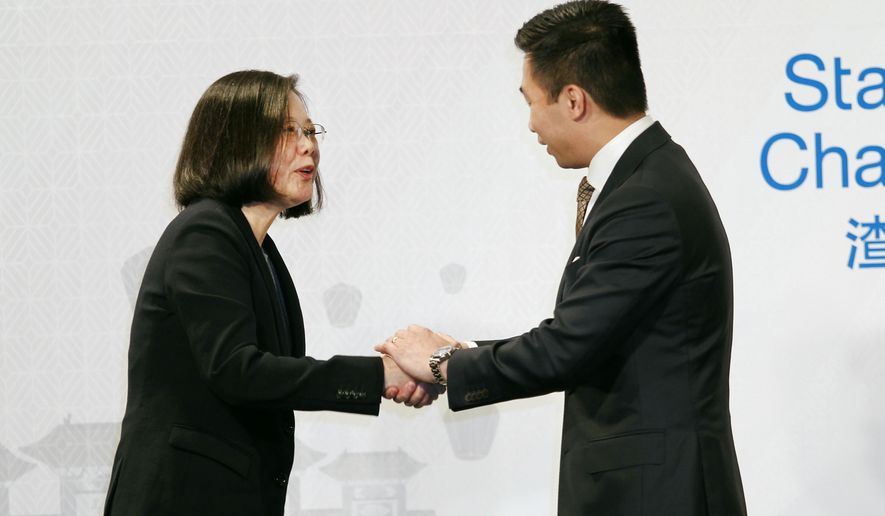TAIPEI, Taiwan (AP) - A senior U.S. diplomat said at an event in Taipei on Wednesday that the United States wishes to “bolster Taiwan’s ability to defend its democracy” after President Donald Trump signed a new law promoting official exchanges between the two sides that has drawn protests from Beijing.
“We wish to strengthen our ties with the Taiwan people and to bolster Taiwan’s ability to defend its democracy,” said State Department official Alex Wong. “Our commitment to these goals has never been stronger.”
Speaking at a dinner with the American Chamber of Commerce, Wong was joined by Taiwan President Tsai Ing-wen, who expressed gratitude for Trump’s signing of the new Taiwan Travel Act and also noted the president’s approval last year of a $1.4 billion arms sale to the island.
“The announcement of a major arms sale last year within the first five months of President Trump’s administration showcased the United States’ unwavering commitment to Taiwan’s continued safety and security,” Tsai said.
Taiwan’s defense minister earlier announced that China’s sole operating aircraft carrier, the Liaoning, had been spotted entering the Taiwan Strait separating the sides on Tuesday.
The defense minister, Yen Teh-fa, told a legislative hearing that Taiwan’s armed forces were monitoring the situation but declined to give further details. The 60,000-ton craft commissioned in 2012 has been conducting military operations in the East China Sea in recent days, Yen said.
The Liaoning has previously transited the heavily trafficked 160 kilometer (100-mile) -wide Taiwan Strait.
Wong’s visit to Taiwan drew new criticism on Wednesday from China, which claims the self-ruled island as its own and has sought to isolate it diplomatically.
China has already lodged a protest over the new Taiwan Travel Act, saying it violates U.S. commitments not to restore formal exchanges severed when Washington switched diplomatic recognition from Taipei to Beijing in 1979.
The new law, signed by Trump last Friday, allows unrestricted travel by U.S. officials to meet with members of Taiwan’s government and for Taiwanese officials to visit the U.S. under “respectful conditions,” during which they are allowed to meet with their counterparts, including those from the departments of state and defense.
China urges the U.S. to hold to previous undertakings, cease “any kind of official exchanges and interactions with Taiwan, and properly deal with the Taiwan-related issue with caution so as to avoid severe damage to the China-U.S. relations and peace and stability in the Taiwan Strait,” Chinese foreign ministry spokeswoman Hua Chunying said at a regularly scheduled briefing.
Wong’s formal title is deputy assistant secretary for East Asian and Pacific affairs. His appearance at the event Wednesday and the signing of the law come as China is ratcheting up diplomatic and economic pressure on Tsai in response to her refusal to endorse Beijing’s “One-China” principle under which Taiwan is considered a part of China.
On Tuesday, Chinese President Xi Jinping warned that any attempt to separate any part of China from the nation would be “doomed to failure,” a message implicitly directed at Taiwan and the U.S. Xi said China would continue to seek peaceful unification with the island, from which it separated amid civil war in 1949, although China has refused to rule out using force to bring Taiwan under its control.
___
Wang reported from Beijing.
___
This story has been corrected to show that the name of the legislation is Taiwan Travel Act instead of Taiwan Travel Law.




Please read our comment policy before commenting.